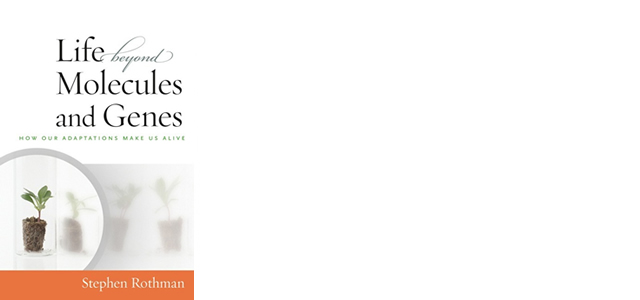Stephen Rothman, Templeton Press
What is life? What makes us live? Such questions broach a wondrous topic — maybe the most wondrous of all.
In answer, Rothman argues that we and all living things live because we adapt. Adaptations — active adjustments to changeable external conditions, for the sake of internal stability (or as he puts it, “any feature of an organism, including its psychological, behavioural, and social aspects that helps it cope with its environmental circumstances”) — are the sufficient condition of life.
This is a distinctive thesis that goes against the flow of current discussion as I understand it. One point of identifying adaptations, and only adaptations, as sufficient conditions of life, is to refute the reductive materialism of a Richard Dawkins. Dawkins argues that life is just a matter of molecules and genes. On such a view, life is an intrinsic property of certain chemical compounds, crucially of DNA.
DNA’s complexity and reactive properties produce life. Thus, the story of life as told by Dawkins can be reduced to a story of the “selfish gene”.
But Rothman repeatedly and I think persuasively points out that although DNA is necessary for life, it is not sufficient. When I die, it will not be not because my DNA somehow dies — those molecules retain their complex properties post-mortem for some time. I will die because I am unable to adapt anymore to conditions that threaten my physical survival.
It may be that the conditions are below my awareness and the adaptations needed are not those I can make consciously. Nevertheless, it is adaptation that makes me alive; failure to adapt that spells the end of life.
What an interesting idea! Among other things it means we can say that “life is not a single state, discontinuous from all others, but a continuum of states, of varying degrees of adaptive competence, and consequently aliveness.”
Life is action in an environment, is (going slightly further than Rothman does) ecological interaction. Rothman shows how his idea leads to a scientifically grounded recognition of the non-reductive sense of life as we live it: “uncertain, fragile, persevering, painful, cruel, perverse, joyful, and exultant”.
As a religious reader, this conception of life invites reflection on what meaning today Jesus’ words in John’s gospel might bear: “I have come that they might have life, and have it abundantly.” What adaptations can and should we make for the sake of livelier ecological participation?
I confess I was more puzzled by Rothman’s arguments for the inevitability of the evolution of life. Further, his talk of life as “spirit” needs to be given a more careful sense given his arguments, one less susceptible to supernatural interpretation.
You’ll need your wits about you, because Rothman’s topic is big and difficult. Yet he writes with admirable clarity, at a level appropriate for non-specialist readers.
Take me for example: I have interest in current evolutionary biology and genetics, but not much more than passing acquaintance with the state of those sciences. Rothman helped me understand enough to appreciate his case.
Andrew Irvine














